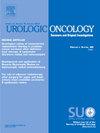免疫疗法完全反应后延迟部分肾切除术:可行性和结果(UroCCR n°157)。
IF 2.4
3区 医学
Q3 ONCOLOGY
Urologic Oncology-seminars and Original Investigations
Pub Date : 2025-05-01
DOI:10.1016/j.urolonc.2024.11.003
引用次数: 0
摘要
背景:转移性肾癌患者对免疫疗法的完全反应重新引起了人们对原位手术的兴趣。这些患者生存期的延长促使人们考虑在技术可行的情况下进行保留肾脏的手术。鉴于文献中报道的手术困难,评估免疫治疗后肾部分切除术(PN)的可行性以及功能和肿瘤效果至关重要:方法:基于 UroCCR 数据库的多中心回顾性研究,包括所有在转移部位对免疫疗法完全应答后接受肾部分切除术的转移性患者。对发病率、肾功能、阳性边缘率和肿瘤结果进行评估:2019年1月至2023年9月期间,13名患者在接受免疫检查点抑制剂(ICI)治疗后接受了PN。手术时的中位年龄为64岁[50-68岁];84.6%的患者接受了ICI作为一线治疗,中位疗程为11.7个月[7.7-14.9个月]。所有患者的手术切缘均为阳性,5 名患者(38.5%)为 ypT0。两名患者(15.4%)出现术中并发症,一名患者出现严重术后并发症。3 个月后的中位 GFR 为 84.7 [66.6-95.2] mL/min/1.73 m2,与术前相比无明显差异。术后,10 名患者(77%)未再接受免疫治疗。中位随访时间为 25.6 [19.6-30.2] 个月,中位无治疗生存期为 22.4 [15.8-34.7] 个月。12个月和最后一次随访的RFS分别为84.6%和53.8%。最后一次随访时的OS率为92.3%:该系列研究表明,在接受免疫检查点抑制剂治疗后进行肾部分切除术是可行的,发病率可接受,且没有可归因于先前治疗的重大困难。虽然数据显示功能和肿瘤学结果良好,但仍需进一步研究。这项研究强调了多学科肿瘤委员会对转移性病例进行早期再评估的重要性。本文章由计算机程序翻译,如有差异,请以英文原文为准。
Delayed partial nephrectomy following complete response to immunotherapy: feasibility and results (UroCCR n°157)
Background
Complete responses to immunotherapy in metastatic kidney cancer have led to a renewed interest in primary-site surgery. The prolonged survival of these patients has prompted consideration for nephron-sparing surgery when technically feasible. Given the surgical difficulties reported in the literature, it is essential to assess the feasibility as well as functional and oncological results of partial nephrectomy (PN) after immunotherapy.
Methods
Multicentric retrospective study based on UroCCR database, including all metastatic patients who underwent PN after a complete response to immunotherapy at metastatic sites. Morbidity, renal function, positive margin rate, and oncological outcomes were assessed.
Results
Thirteen patients underwent PN after immune checkpoint inhibitor (ICI), between January 2019 and September 2023. Median age at surgery was 64 [50–68]; 84.6% received ICI as first-line treatment with a median duration of 11.7 [7.7–14.9] months. None of the patients had positive surgical margins, five patients (38.5%) were ypT0. Two patients (15.4%) presented intraoperative complications and 1 a severe postoperative complication. Median GFR at 3 months was 84.7 [66.6–95.2] mL/min/1.73 m2 with no significant difference from preoperative GFR. After surgery, immunotherapy was not reintroduced in ten patients (77%). Median follow- up was 25.6 [19.6–30.2] months, median treatment-free survival was 22.4 [15.8–34.7] months. RFS at 12 months and at last follow-up were 84.6% and 53.8%. OS rate at last follow-up was 92.3%.
Conclusion
This series demonstrates the feasibility of partial nephrectomy following immune checkpoint inhibitor treatment, with acceptable morbidity rates and no major difficulties specifically attributable to the prior treatment. While the data suggest promising functional and oncological outcomes, further investigation is needed. The study underscores the importance of early re-evaluation of metastatic cases in multidisciplinary tumor boards.
求助全文
通过发布文献求助,成功后即可免费获取论文全文。
去求助
来源期刊
CiteScore
4.80
自引率
3.70%
发文量
297
审稿时长
7.6 weeks
期刊介绍:
Urologic Oncology: Seminars and Original Investigations is the official journal of the Society of Urologic Oncology. The journal publishes practical, timely, and relevant clinical and basic science research articles which address any aspect of urologic oncology. Each issue comprises original research, news and topics, survey articles providing short commentaries on other important articles in the urologic oncology literature, and reviews including an in-depth Seminar examining a specific clinical dilemma. The journal periodically publishes supplement issues devoted to areas of current interest to the urologic oncology community. Articles published are of interest to researchers and the clinicians involved in the practice of urologic oncology including urologists, oncologists, and radiologists.

 求助内容:
求助内容: 应助结果提醒方式:
应助结果提醒方式:


